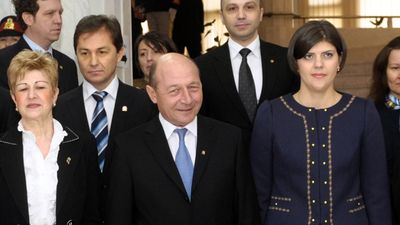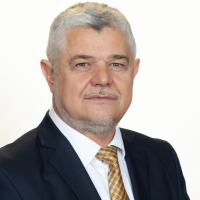REPORT on the subversive activity conducted between 2005 – 2017 in the sectors of Justice and intelligence services, to enable political-judicial-economic interest groups to exercise state power
 Bucharest, 9 nov. 2017 - Lumea Justitiei (www.luju.ro)
Bucharest, 9 nov. 2017 - Lumea Justitiei (www.luju.ro)
Read here the Romanian version of the Report
----------------------------
REPORT
on the subversive activity conducted between 2005 – 2017 in the sectors of Justice and intelligence services, to enable political-judicial-economic interest groups to exercise state power
1. History of the binominal system formed by the Romanian Intelligence Service (SRI) and the National Anticorruption Directorate (DNA)
Romania ratified the Convention for the Protection of Human Rights and Fundamental Freedoms through Law No. 30/1994. In its Constitution revised in 2003, Romania is defined as a semi-presidential republic; a democratic and social State founded on the rule of law, which guarantees the rights and freedoms of its citizens, with the national legislation subordinated, in cases of inconsistencies, to the international pacts and treaties on human rights to which Romania is a party.
Romania joined the European Union on 1 January 2007, when the Cooperation and Verification Mechanism (CVM) was put in place, for remedying the deficiencies of the reform in the judicial system and for fighting corruption.
Despite the commitments towards the European Union and other international bodies, starting 2005 the then newly-elected president of Romania, Traian Basescu, together with the heads of the institutions of force he appointed soon afterwards, laid the basis for a secret system, hidden from the public eye. The system gradually developed and in the end unlawfully and occultly took over the decision-making power in the State, using handcuffs and criminal cases as weapons. This resulted in the destruction of Romanian elites, the political class (political parties and the Parliament were undermined), the business environment, the free media, and in the destruction of that part of the judicial system which refused to stoop and cooperate with the newly-created system.
Unlawful non-public regulatory acts were issued by institutions that do not have the power to legislate in the field of Justice and Human Rights:
- decisions issued by the Supreme Council of National Defence (CSAT) (an administrative body), which were classified as state secrets;
- secret action plans and protocols between the intelligence services and the prosecutors’ offices, which created an unknown legislation on corruption, with procedures and prosecution acts which, in many cases, were inaccessible even to the indicted parties.
Based on the secret protocols between the prosecutors’ offices and the intelligence services, hundreds of joint teams were created, made up of prosecutors and intelligence officers working on corruption cases. However, the law does not allow intelligence officers to conduct prosecution activities and it forbids magistrates to collaborate with the intelligence services, or else such magistrates must be removed from office (Article 7 of Law 303/2004).
The interception of (phone and online) communications at national level was entrusted without any legal basis to SRI, which conducts such activity through two secret military units, the establishment of which is not provided by any law: the National Centre for Interception of Communications and the Cyberint National Centre. Not even today is it possible to challenge SRI’s interceptions used in criminal proceedings and to have independent experts issue a real counter-appraisal, because no independent voice and speech experts have ever been authorised. Besides, even if foreign experts were accepted, they cannot have access to the servers inside the SRI units, because the activity of the Service is classified as a state secret.
Large prosecutors’ offices went through a massive purge. In August 2005, former Minister of Justice, Monica Macovei, revoked 13 heads of the National Anticorruption Office and replaced them by a group of obedient prosecutors, politically appointed by Minister Macovei and President Basescu. In 2006, despite the negative opinion expressed by the Superior Council of Magistracy (CSM) in this respect, Romania’s General Prosecutor Ilie Botos (who was forced to resign) was replaced by Laura Kovesi, a low-ranking prosecutor who was only 33 years old, had no experience and had not prosecuted any major case yet.
Dozens of senior judges from the High Court and the courts of appeal were determined to retire, on the one hand lured by an attractive retirement law (offering a pension almost equal to the income for their last month of work) and on the other hand under pressure of public accusations and criminal cases (public humiliation). There is information that, in some cases, data from the archives of the former secret service of the Ministry of Justice - SIPA (The Independent Protection and Anticorruption Service) were used. The archives were accessed repeatedly, even by unauthorized persons who did not have a certification from the National Registry Office for Classified Information (ORNISS). The senior judges removed from office were replaced by judges co-opted through the system channels, who were willing to team up with prosecutors in the fight against corruption. Livia Stanciu herself, i.e. the President of the High Court of Cassation and Justice (appointed in 2008 by Traian Basescu), publicly declared in February 2014, at a review of the National Anticorruption Directorate’s achievements: “The DNA prosecutors will always have a reliable partner in judge Stanciu.”
Starting from 2005, the laws on justice were amended in that the National Anticorruption Directorate was granted enormous powers (the abuse of office, which is not an act of corruption but currently accounts for two thirds of the DNA cases, made it possible that politicians, state officials and local government officials be charged in criminal cases for any decisions they made). Prosecutors were allowed total independence from their superiors. Anticorruption prosecutors gained the upper hand over judges, who were constantly enticed and determined to team up with the prosecutors, or were indicted in DNA cases if they ruled against such prosecutor’s office (Stan Mustata, former judge of the Bucharest Court of Appeal, is the most relevant example in this respect: he was arrested by the DNA right before entering the court in a high-profile case, after he was recorded confessing to a close person that there was no evidence in that case).
Members of the Parliament and of the Government (particularly members of the Social Democratic Party) became the main target of criminal cases, amid aggressive public denigration campaigns launched by the Romanian Presidency.
Subsequently, based on Small Justice Reform Law No. 202/2010, which was initiated by former Minister of Justice Catalin Predoiu, two 5-member Panels were set up in the High Court, one of which was led by the Chairman and the other by the Deputy Chairman of the High Court of Cassation and Justice – both of them appointed by Traian Basescu. The Panels were used to circumvent the ‘random distribution of cases’ principle, so that all the cases involving officials and high magistrates would end up before these “execution panels”, whose members would be selected in advance and would render decisions that the public could easily foresee.
It was insidiously claimed that this whole action plan was made ‘in the name of the fight against corruption’, a battle cry exaggerated to absurd levels. Judicial abuses against the political class, the business environment in Romania, the free media and the judicial system became an everyday fact. However, no one was held accountable for these abuses under the law, because the large prosecutors’ offices became spearheads and protectors of the system before the law, together with the Superior Council of Magistracy, which was largely staffed by magistrates supported by the SRI to get on the Council or with magistrates involved in criminal cases that the DNA holds and may activate at any time.
Actually, the Romanian institutions of force, in particular: the General Prosecutor’s Office – the National Anticorruption Directorate (DNA), the Romanian Intelligence Service (SRI), the National Integrity Agency (ANI), some judges of the High Court of Cassation and Justice (HCCJ) and from the main courts focused on hunting members of the Parliament, of the Government, businessmen, media owners and certain magistrates, to send them to prison and out of the public life.
The handcuffed processions in front of the DNA, the intentional data leaks in criminal cases to the DNA-friendly media which are meant to tarnish the reputation of investigated persons from the very beginning, DNA’s press releases in which the accused are declared guilty before their case is brought to court have become an everyday fact and have constantly been on the press agenda since 2006, although European laws and regulations mandatorily require compliance with the professional secrecy and the presumption of innocence.
Whoever has dared to criticize the abusive activity of the institutions of force has been publicly labelled an enemy of the fight against corruption and has been silenced, and fear of taking critical positions against the abuses of the institutions of force has been instilled, in particular among elected politicians.
External forces having interests joined, too, in supporting the unlawful system during its development stage. They acted through NGOs funded by businessman George Soros’ foundations, and through representatives of the embassies of the great allied Powers (in particular the US Embassy in Bucharest) and decision-makers of the EU bodies in Brussels. The support from abroad for the institutions of force had two constant features:
- the false accusation that the political class would intend to undermine the fight against corruption;
- an absolute silence and a total lack of reaction to hundreds of abusive cases resulting in acquittal when it was proven in court that they had been fabricated in the absence of evidence and in violation of human rights.
The concerned NGOs have constantly invited key judges and prosecutors to workshops organised in Romania and abroad, financed from their own resources or from EU funds. Some magistrates were paid thousands of euro to deliver speeches. There is a legitimate suspicion that this form of judicial tourism was and still is some sort of material incentive scheme. There are well-known cases of magistrates sitting in sensitive cases that resulted in heavy punishments against political figures, and who were invited dozens of times per year to events in Romania and abroad where the organisers paid for their transport, accommodation and other costs.
According to public sources, in particular the ambassadors of the USA and the Netherlands officially or discretely intervened with the Romanian Ministers of Justice or other officials for the appointment and maintenance of Laura Kovesi at the helm of the DNA, in breach of Article 41 of the Vienna Convention, which forbids diplomats to interfere in the internal affairs of the receiving State.
Also, the heads of SRI and DNA were decorated several times by the big embassies, for merits impossible to justify in the case of intelligence officers and magistrates, who may not conduct any activities to the benefit of other States. The decoration of the heads of SRI and DNA adds to the fact that, on the one hand, although major foreign companies and banks have been taking their profit abroad for years and do not pay any corporate income tax, they have never been indicted on charges of tax evasion and money laundering and, on the other hand, 27 years after the fall of communism in Romania in 1989, when the entire economy was 100% state-owned, more than two thirds of the turnover of companies operating in Romania is currently held by foreign companies, just as most agricultural and forest lands or the exploitation of natural resources.
Inexplicably, the annual CVM Justice reports of the European Commission Delegation have always been silent about the abuses. They merely praised the institutions of force and branded the political class with permanent accusations that it wanted to destroy the anticorruption fight. The annual CVM reports have never approached the very serious issue of the abuses committed by the institutions of force, the huge number of acquittals because DNA did not prove the cases, despite numerous signals from political factors, the media and the victims of abuses.
After November 2014, when the second term of office of Romanian President Traian Basescu ended (he was in office for 10 years), the occult system referred to in Romania as “the DNA – SRI Binomial System” reached the peak of its illegitimate and abusive activity. Each year, the courts found that hundreds of criminal cases were not proven, with the rate of acquittals for lack of any evidence produced by DNA reaching a whopping 37% in one of the court divisions in the first half of 2017 (while national and EU average is around 1%).
In 2017, DNA’s abusive activity culminated in the unlawful opening of a criminal case against the Romanian Government (the GEO 13/2017 Case) for having issued an emergency ordinance. This investigation was declared abusive by the Constitutional Court, which qualified the criminal investigation as an interference with the activity of another state power, i.e. the executive power. The abusive activity of DNA continued after the decision of the Constitutional Court, with DNA opening a criminal case against PSD’s Vice-President Sevil Shaidehh on charges of having issued several government decisions a few years ago. This investigation made the Vice-President resign from office in the fall of 2017, although prosecutors are not authorized to investigate how legislative acts are issued by the executive power. The abuse is clear, since Vice-President Sevil Shaidehh was accused that she was not authorized to decide on the transfer a land from the public property of the State to the public property of a county council under government decision, but only under a law, although a specific piece of legislation was in force in Romania according to which such transfers were to be made by government decision, with hundreds of such government decisions having been issued to date.
Former President Traian Basescu himself, whose family became the target of DNA’s criminal cases, admitted in 2016 that it was him who created this system which got out of control after he left because of the people he appointed in key positions in the Ministry of Justice and SRI and who are still in office to this day. He called this system a “MAFIA STATE”, which acts by any means just to save itself and to remain in power.
Currently, SRI, the management of which has been replaced, announced that it denounced the secret protocols concluded since 2009 with the large prosecutors’ offices (but it did not declassify them) and hints, still unconvincingly, that it has drawn back from the “tactical field” of Justice. Unfortunately, despite the disastrous activity of DNA and the numerous public scandals in which the head of such prosecutor’s office, Laura Kovesi, was and is still involved, she has media support from foreign-funded NGOs, foreign press institutions and certain ambassadors, and she has been given the diversionist nickname of “icon of the anticorruption fight” in Romania. The campaign led by “foreign agents” became extremely aggressive after the Judicial Inspection conducted, in the summer of 2017, an investigation on the DNA management of recent years and found disastrous results, which generated a vivid public/political debate in the society as to the need to urgently remove Laura Kovesi from office. The campaign led by “foreign agents” also aims at preventing any amendments to the laws of justice, so as not to provide for magistrates’ liability that would result in punishments for judicial abuses and in removing the prosecutors and judges who render the decisions they are ordered to render.
Two special investigation commissions of the Parliament are currently trying to shed some light on the inside of the “Mafia State” which developed under President Traian Basescu.
* * *
2. Unlawful acts and procedures that created an underground justice
We will describe in this chapter several regulatory acts, so as to better understand how representatives of state institutions got to see themselves as representing the State:
- Decision No. 17/28.02.2005 of the Supreme Council of National Defence (a secret act whereby corruption was declared a national security liability so that it may become the “tactical field” of SRI)
National Security Law No. 51/1991 does not provide for any competences of SRI in the field of corruption offences, since threats to national security, as listed in Article 3, do not include corruption offences. However, President Traian Basescu knew the practices of the former communist Intelligence Service, which had a 6th Department for criminal investigations, and he decided to involve the SRI in the fight against corruption, disregarding the fact that Law 51/1991 could only be amended by another law.
Noteworthy, SRI is actually the successor of the former communist Intelligence Service which operated officially until 1990, even if SRI claims to have fully reformed and was under an obligation to refrain, in the absence of a law, from conducting any activities for which it did not have legal competences.
Despite Article 61 of the Constitution, according to which the Parliament is “the only legislative authority of the country”, the decision to include corruption in the category of national security liabilities was made by CSAT Decision No. 17 of 28 February 2005, which is a non-public and classified decision. CSAT could not supplement Law 51/1991, since it is not a legislative authority, but an administrative body, acting under the authority of the Romanian President, who is the de jure President of CSAT – see Appendix 1.
The protocol, kept secret to this day, was concluded in 2009 (most probably by the former chief prosecutor of Romania, Laura Kovesi and the former heads of SRI, George Maior and General Florian Coldea), based on CSAT Decision No. 17/2005. It was communicated to all large prosecutor’s offices in Romania and it became a classified working document, meaning that under the Protocol hundreds of joint teams consisting of prosecutors and intelligence officers were created “to counteract the risks arising from criminal activities”.
Creating joint teams, a practice which is particular to the former communist Intelligence Service, was and still is prohibited by criminal procedure, which does not allow intelligence officers to carry out any criminal prosecution activities, and also by Article 7 of Law No. 303/2004 on the status of prosecutors and judges, prohibiting magistrates from collaborating with the intelligence services or else they would be removed from office. Note should be made that in reply No. DNS/288 of 16 February 2016 given by the Department of National Security to the National Union of Judges in Romania, it was pointed out that the symbiosis between prosecutor’s offices and SRI was meant to “prevent the access of corrupt persons to public offices”, which is unconceivable in a State whose Constitution provides that a person is presumed innocent until finally convicted.
The Protocol was acknowledged for the first time in SRI’s 2009 Activity Report (page 11). In a reply given by DIICOT to Ploiesti Court of Appeal on 23 August 2017, the prosecutor’s office acknowledged that SRI carried out wiretapping activities in criminal cases under said Protocol, but also according to the National Anticorruption Strategy, which is not a law, but a statement of intention on criminal law policies – see Appendices 2, 3, 4, 11
The protocol between SRI and DNA was denounced in a declarative manner in 2016 by the new SRI management, but the act was not declassified or made known to the public and to the parties in the criminal cases created by such unlawful practices, of which many are still pending before the courts. Note should be made that Decision No. 51/2016 of the Constitutional Court established that the collaboration between SRI and the prosecutors to handle ordinary crimes was unlawful, as such ordinary crimes do not fall under the scope of national security law. Such decision attests to the unlawful nature of these protocols which operated from 2009 to 2016.
Noteworthy, the secret correspondence exchanged between DNA and SRI in certain criminal cases often referred to Articles 8 and 57 of the Protocol to request that “the data submitted should be meant solely for the information of the prosecutor handling the case, on a need to know basis, without being filed in the case”. Such wording was also used in DNA case No. 435/P/2012 concerning the former Secretary of State of the Ministry of Transport, Valentin Preda, where the main target was Liviu Dragnea, president of PSD Party - see Appendices 9, 10
- Cooperation Plan No. 003864826 of 13 July 2011 (the document on the basis of which lists were drawn with the persons who had to be removed from the public life by being indicted in criminal cases).
This document, which was mentioned in certain official documents, was not declassified, nor was it made public, and such plans could have been prepared every year as of 2009, when the Protocol between the Prosecutor’s Office of the High Court of Cassation and Justice and SRI was signed. According to authorised sources, this plan was focused on listing the persons to be methodically prosecuted and indicted on criminal charges, so as to be removed from their public offices, aiming particularly at members of Parliament, ministers, county council chairmen, mayors, magistrates, businessmen and media owners – see Appendix 4
General Dumitru Dumbrava, head of SRI’s Legal Department, made an official admission for the publication www.juridice.ro, stating that SRI created a “tactical field” in Justice, which followed the evolution of the cases from the opening and until a final ruling was rendered by the highest-ranking courts.
- National Centre for Interception of Communications (a military unit of SRI, with no legal personality, established by secret decision of CSAT)
This is the structure through which SRI has the ultimate control over the national wiretapping system. There is no law on the establishment of this Centre, which has been operating illegally for at least 10 years, thus raising numerous public questions, including from professional magistrates’ associations. These questions have never been answered. The former Minister of Justice, Raluca Pruna, mentioned a figure of up to EUR 1 billion in costs for the national wiretapping systems. This secret centre, which does not exist according to the law, puts in practice wiretapping warrants for national security reasons, requested by SRI and approved by four judges from HCCJ. According to their answers to the press, these HCCJ judges issue approx. 4000 warrants for national security per year, and no SRI request was ever refused. According to other sources, the total number of wiretapping warrants (for other crimes than those against national security) amounted to approx. 250,000 as of 2005 until 2014.
Although SRI is a party in the cases requiring warrants for national security, SRI officers – General Dumitru Dumbrava, together with prosecutor Horatius Baias, head of DNA’s Technical Department, HCCJ Vice-President Rodica Aida Popa – head of Security Division in HCCJ, were photographed at joint events and the images were proudly posted on the official HCCJ website (www.scj.ro) to show how the warrant-issuing judges are being taught the “culture of secrecy”, which reveals the lack of impartiality and objectivity of magistrates dealing with SRI requests for wiretapping authorisations, who should refrain from joint public appearances, whereas Romanian law does not allow judges to contact the parties in the cases they are handling – see Appendix 5
Note should be made that wiretapping operations performed in criminal cases by SRI cannot be appraised to determine whether the recordings are false or not, since they are filed as copies on optical storage media – DVD - comprising selections of the recordings. This is against the international laws on appraisal, requiring that the expert witness be provided with the original recording media and the original recorder used; in absence thereof, it cannot be determined if the recordings are authentic and original. An independent appraisal also requires that the expert has access to the recording equipment, so as to be able to determine the number of minutes/hours/days of wiretapping and whether all recordings made were filed in the case, whether any key parts thereof which would exculpate the suspect were removed and whether only the incriminating parts were kept. The access to SRI servers (which are recording on hard disk media) is not possible, because the National Centre for Interception of Communications is a military unit of SRI, and its activity is a state secret.
Moreover, forensic voice and speech experts have never been authorised in Romania, and thus the only experts that could be used are governmental employees, from INEC, ITA – SRI, IGPR, which does not guarantee impartiality according to international laws (since they are paid by the accusing State) and they were all trained by the Romanian Intelligence Service. Even in the cases where experts concluded that the recordings are not authentic or original (because the original equipment was missing), the judges of the system, particularly those from HCCJ and Bucharest Court of Appeal, disregarded the conclusions of such expert appraisals and gave convictions based on unoriginal and unauthentic recordings, in blatant breach of ECHR judgments rendered in Strasbourg against Romania in the cases “Dumitru Popescu v. Romania” in 2007 and “Valentino Acatrinei v. Romania” in 2013, due to lack of guarantees of the wiretapping operations carried out by SRI under the national security law.
-Cyberint National Centre, established in 2009 by classified CSAT Decision (a military unit of SRI, monitoring the databases of public institutions)
This is another SRI military unit, with no legal personality, which was not established under a law, but under a CSAT decision mentioned in SRI’s 2009 Activity Report (page 4 of the report). This Centre concluded protocols with more than 60 public institutions for the protection of information on their websites and electronic databases. Even the Superior Council of Magistracy concluded a protocol with this Centre, although the latter does not exist, there is no law setting forth its establishment, and it is therefore legitimate to suspect that this structure merely spies on the electronic databases of all public institutions. In 2016, SRI’s Colonel (in reserve) Ion Dedu warned that Cyberint National Centre was intended to become the only institution ensuring cybersecurity, meant to monitor the internet and by consequence the population, in order to attain the aim provided in “Romania’s Cybersecurity Strategy”, which was in its turn determined by a secret CSAT decision which has never been made public, i.e. Decision No. 16/2013 – see Appendices 6, 11
-CSM Decision No. 140 of 6 February 2014 on the access of magistrates to classified information (whereby judges and prosecutors were forced to sign commitments with SRI)
In 2014, thousands of magistrates were forced to sign Commitments to protect state secrets managed in Romania by SRI under Law No. 182/2002 on classified information. Ironically, CSM Decision No. 140/2014 (to which the Commitment form was attached as appendix) was signed by CSM’s President of 2014, HCCJ Judge Adrian Bordea, son of General Aron Bordea, former head of the Political 1st Division of the Intelligence Service during the communist regime. The judges who did not sign the Commitment were removed from cases involving classified information, because they were considered unreliable for SRI. Those who signed the Commitment accepted to observe the requirements of Law No. 182/2002, in the sense that they could be monitored at any time by SRI, by wiretapping and stake-outs, without any warrant, whereas under Law No. 182/2002 SRI had the right to control and, if finding that the rules on the protection of classified information were not observed, it was entitled to apply misdemeanour penalties or to notify the criminal investigation bodies – see Appendix 8
Under Article 11 of CSM Decision No. 140/2014, defendants and lawyers were denied access to classified documents in their own cases: “In cases involving classified documents, such documents are to be kept in separate volumes which cannot be accessed by the public. These documents may be accessed by court staff or, as the case may be, the staff of prosecutor’s offices, by the parties, by their defendants, by the experts and interpreters, as per the procedure regulated under Law No. 182/2002, as further amended and supplemented, Government Decision No. 585/2002, as further amended and supplemented, and respectively Government Decision No. 781/2002 solely if they hold a security certificate for access to classified information or access license, according to the class and respectively the classification level of every document in said volume, and if they provide arguments supporting the “need-to-know” principle”.
It is obvious that a person under criminal prosecution will never get an ORNISS certificate for access to classified information, so that the defence was annihilated in many cases, where the magistrates were able to indict and convict a person based on classified evidence, to which the accused was not allowed access, although such practice is prohibited by ECHR. CSM Decision No. 140/2014 caused the indignation of the Magistrates Association of Romania, which appealed the decision in court and moved for its annulment.
- heads of DNA frequently refer to the intelligence services as “secondary beneficiaries” of the wiretapping warrants obtained by DNA under authorisation from the judge, in corruption cases (a practice which was declared unconstitutional by Decision No. 51/2016 of the Constitutional Court of Romania)
DNA’s unlawful cooperation with the intelligence agencies also follows from numerous procedural acts where DNA’s management, after having obtained wiretapping warrants for acts of corruption from the High Court, it would appoint as “secondary beneficiaries of the warrants” various SRI military units and the Information and Internal Protection Department (i.e., the intelligence service of the Ministry of Internal Affairs). Noteworthy, according to the warrant issued by the judge, it was DNA, and not the intelligence services, which was authorized to carry out the wiretapping operations through prosecutors or criminal police officers. These practices were declared unlawful by the Constitutional Court, under Decision No. 51/2016. From then on, SRI and other services were forced to withdraw from the “tactical field” that they accepted to join in an unlawful and abusive manner, based on a protocol that fell outside the scope of the law – see Appendix 8
* * *
3. Abusive practices in DNA prosecutors’ work
According to the numerous testimonies given by subjects of DNA prosecutors’ investigations and to various official documents, the manner of performing anticorruption investigations generated and continues to generate serious infringements of human rights, brought forward by the hundreds of acquittals handed down annually by the courts.
Since 2010, the website of Lumea Justitiei (www.luju.ro) presented hundreds of cases of judiciary abuse, supported by documents and attesting to these practices.
The abuses occurring in DNA’s activity increased to an alarming rate after 2012 when former chief prosecutor Daniel Marius Morar was replaced by Laura Codruta Kovesi. This was also because, after Laura Kovesi was appointed, prosecutors were massively recruited by mere interviews and the newly recruited prosecutors were mostly transferred from first-level prosecutor’s offices of district courts, with only 4 or 5 years of service (including traineeship), lacking experience and who had never handled any complex cases.
Basically, a district court prosecutor paid with RON 7,000, once brought to DNA is automatically granted state-paid housing, take-home vehicle and his/her pay is raised from RON 7,000 to more than RON 20,0000 (almost EUR 5,000). The appointment of prosecutors hired by interviews, i.e. most of DNA prosecutors, can be terminated at any time by order of DNA’s chief prosecutor, if they are no longer deemed fit, and by consequence they lose all these privileges. The amateurism of these prosecutors and their availability to act as suggested so as to keep their privileges generated a significant increase in the number of acquittals, from an already alarming 10% to more than 37% in 2017. For the sake of comparison, the average percentage of acquittals for the other prosecutor’s offices in Romania, i.e. several hundred of them, is 1%.
We believe that these disastrous results were favoured by the dictatorial behaviour of Laura Kovesi, DNA’s Chief Prosecutor, who requested during the working sessions as many cases as possible involving dignitaries, prime ministers, etc. and prided herself in stating, during public interviews, that “we even indicted those who appointed us”. The annual audits organised in a grandiose manner by Laura Kovesi as of 2013, followed by banquets (such displays were not in place before she became DNA’s chief) have circumvented any sort of professional liability of the prosecutors, they were merely laudatory inventories of the number of ministers, members of parliament, mayors, heads of county councils, businessmen and magistrates who were indicted, without ever being of any consequence that many of these cases presented as triumphs ended in acquittals by the court.
Some of the prosecutors brought by interview to DNA had a criminal behaviour, they threatened the suspects, harassed women and submitted the accused and their families to psychological torture or destroyed their career and business.
Acquittals have never been a reason for concern for DNA’s management, which claimed that no prosecutor can be held liable for an acquittal, whereas Laura Kovesi, DNA’s chief, personally got the worst of it in a single case (the Referendum Case) in which she signed the indictment in 2013: 46 persons acquitted by final ruling for lack of evidence.
Note should be made that most acquittals were given for lack of evidence, which reveals that the cases are scraped up/fabricated usually based on denunciations extricated under pressure of arrest and selective wiretapping, randomly interpreted by prosecutors (mere essays based on prosecutors’ assumptions). On the other hand, more than ¾ of the convictions obtained in court by DNA are suspended sentences, which reveals the inconsistency of accusations or judges’ fear of giving acquittals for lack of evidence so as not to deal with DNA’s retaliation afterwards.
As regards the fear instilled by DNA in magistrates, the wiretap recording of judiciary inspector Mihaela Focica in the summer of 2017 is well-known: she complained to her superior from the judicial inspection department, Gheorghe Stan, that during a control performed at DNA offices, she was called by DNA’s management and she was given messages that petrified her, for fear of being indicted, released from office and left with no means to support herself, her child starving to death.
Without going through all the abusive practices invariably denounced by persons having gone through the experience of being subject to criminal prosecution by DNA, and not only DNA, we would like to list the following:
-leaking case-related data to the press and giving press releases that publicly destroyed suspects’ reputation, whereas they were presented as guilty of various criminal offences before a court had ruled to this effect;
-sending the special forces to bring the suspects to the prosecutor’s office and forcing such persons to walk handcuffed in front of the tipped-off media, which is an affront to human dignity. Elderly persons or pregnant women were repeatedly brought by the special forces and handcuffed without any justification;
-lengthy hearings without allowing the suspects to eat or take their medicines when they were sick;
-hearings with the handcuffs on the table, under threat of being arrested unless they admitted to the crimes;
-investigation of suspects’ relatives (particularly spouses and children) summoned for investigations separately, so as to make them have a nervous breakdown and threatening them that they would have the same fate as the suspect;
-sexual harassment;
-searches with the destruction of goods and by seizing personal goods (family photos, etc.) or companies’ documents to block the activity of such companies;
-garnishments unreasonably established on companies’ accounts, causing the destruction of businesses and unemployment;
-determining the suspects, under pressure and threats, to denounce anyone under threat of arrest or under promise of release from arrest or lessening of punishment if they cooperated;
- denunciation became, in most cases, the key evidence, along with unappraisable fragments of wiretapping records. The practice of catching someone in flagrante has disappeared from almost all the cases and has been replaced by denunciations extorted from persons who were not free (i.e., arrested or threatened with arrest);
-vexatious opposition in court and abuse of rights in appealing the decisions of the penitentiary commissions on the proposals for release on parole, so that the convicted persons would not benefit of the months deducted under the law from their punishment for exemplary conduct during detention. There have been cases of convicts in the terminal stage of incurable diseases who were not allowed to die at home, in the name of this inane anticorruption fight. The most revolting case was that of billionaire Dan Adamescu who was not allowed to undergo surgery and died on 24 January 2017, determining his relatives to sue Romania before ICSID – New York;
-fabrication of evidence, particularly distorting the meaning of the transcripts of the wiretapping records used by the accusation. In the court hearings, in many cases the transcripts proved not to comply with the audio files; or hiding favourable wiretapping records;
-placing the cases to judges who were part of the system, particularly submitting to the court the motions with proposals for preventive arrest on the days when judges with whom agreements had been formed were sitting;
-using DNA specialists to determine imaginary damages, in the absence of independent forensic appraisals and suing the suspects without allowing them to submit their own forensic appraisals, mostly in cases of abuse of public office, which is a result crime;
* * *
4. Harmful effects of anticorruption fight on the Romanian society
After 12 years of anticorruption fight, with people walking in handcuffs, trials by TV, resulting from the secret decisions of CSAT and the unlawful protocols between large prosecutor’s offices and the Romanian Intelligence Service, the effects of DNA’s anticorruption fight are as follows:
1 – political elites have been destroyed: Parliament and government members were systematically hunted with cases, they were frightened, and their authority was undermined. Charismatic political leaders were indicted and convicted, suspended and forced to withdraw, and replaced by persons trained by SRI or lacking any particular merit. The high point of this hunt was reached in 2015, when, after the Colectiv Club tragedy, Ponta Government resigned under the pressure of the public slogan “corruption kills” and of the DNA investigation, although it was not liable; after this resignation of the Government, for the first time in Romania the parties withdrew from government to make place for the technocrat Ciolos Government, consisting mainly of persons from the NGOs financed by the foundations of businessman George Soros.
Another climax was reached in January 2017, when the PSD Government, shortly after taking office subsequent to the December 2016 elections, was forced to withdraw GEO 13/2017 which regulated the abuse of public office, under pressure of the criminal case abusively opened by DNA and under pressure of the street instigated by the DNA case, although it was subsequently proved before the Constitutional Court that GEO 13 was totally constitutional and complied with the recommendations of the Venice Commission; the current President of Romania himself, i.e. Klaus Iohannis, seems to be a prisoner of the system, meaning that he and his wife can be prosecuted at any time for the houses they bought in bad faith, that the court forced them to return under civil law;
Outcome: Nowadays, Romania has a political class with no real leaders, lacking the courage to take important decisions for the society (not even in what concerns the liability of magistrates) for fear of being charged with crimes. The amazing thing is that some of them are praising the activity of the institutions of force;
2 - in public and local administration, the decision-making factors do not have the courage to sign for certain investments and public procurement, to take decisions to the benefit of the community, because at any time a DNA prosecutor may suspend and send them to court for opportunity reasons.
Outcome: many community-beneficial objectives are no longer performed;
3 – Romanian businessmen were decimated, hundreds of firms were closed and thousands of people became unemployed further to the corruption and tax evasion investigations of large prosecutor’s offices. Many of these investigations were initiated further to the complaints of the National Agency for Fiscal Management (ANAF), which was officially packed with SRI officers allegedly ensuring national security (after 2016, the new management of SRI declared that it withdrew all intelligence officers from ANAF). In many cases, Romanian businesses were destroyed by garnishments placed on the accounts and accusatory press releases against such businesses issued by the prosecutor’s offices, after which no other work was done on the case for years. However, large foreign companies have never been subject to such devastating treatments.
Outcome: the areas of business of systematically hunted Romanian firms were taken over by multinational companies and foreign banks, which now have the guts not to pay any taxes and duties and to take their profits out of Romania, without ever being investigated by DNA prosecutors on tax evasion matters, and thus causing damage in excess of EUR 1,000,000;
4 - owners of major media enterprises were indicted and convicted, resulting in the disappearance of dozens of traditional media institutions (national televisions and daily newspapers)
After the media was secretly classified by CSAT as a vulnerability to national security, criminal cases were brought against all owners of media enterprises, with the effect of bankrupting or bringing to a state of servitude (insolvency) most important publications and television stations. Irrespective of whether the owners of media enterprises were guilty or not, the bigger picture reveals the existence of a concerted action of the institutions of force to destroy Romanian media, the following persons being arrested, put to prison or indicted:
-owner of OTV, Dan Diaconescu (currently serving a sentence in prison), the OTV station was closed;
-owner of Realitatea TV, Sorin Ovidiu Vantu whose newspapers ZIUA, Gardianul, Curentul were closed, and his TV station taken over;
-next owner of Realitatea TV, Elan Schwartzenberg, an arrest warrant was issued against him after his TV station was subject to a hostile take over by a group protected by the System;
-owner of Romania libera, Dan Adamescu (left to die in prison);
-owner of Intact enterprise, Dan Voiculescu; in his case, the abusive institutions of force did not manage to destroy, not even by establishment of attachments, his TV station Antena 3;
-owner of Evenimentul zilei, Dan Andronic (detained and indicted);
-owner of Adevarul and other publications, Dinu Patriciu (detained and indicted, died after conviction);
-owner of Media Pro and Mediafax media enterprise, Adrian Sarbu (arrested and indicted);
-second owner of Realitatea TV, Sebastian Ghita (former deputy, indicted in several cases after having secured the appointment of DNA’s chief);
-owner of Nasul TV, Radu Moraru (harassed by the institutions of force);
The list is much longer and may be supplemented by other major newspaper journalists and managers (such as Sorin Rosca Stanescu) against whom criminal proceedings were initiated and who were indicted to be removed from public life.
Outcome: genuine media, as little as it remained, is attacked by a parasite-like propaganda in favour of the institutions of force, secretly financed, most probably, by special operations of the intelligence services;
5 - a huge number of judges and prosecutors are targeted by DNA cases, leading to a general fear of conducting a trial according to evidence, which fear was publicly acknowledged by professional magistrate associations. There are magistrates who claimed they were scared not to be suspended and see their children starve to death, because the DNA could at any time indict and remove them from office. Currently, the governing party is trying to establish, by the new justice laws, a directorate of the General Prosecutor’s Office to investigate the offences perpetrated by magistrates, so that the judges would be free from any fear they may be investigated by DNA if they hand down judgments of acquittal in the cases brought to court by such prosecutor’s office;
6 – a real civil society no longer exists, since the NGOs spending European money on anticorruption programs and the NGOs financed by businessman George Soros’ foundations do nothing more than praise DNA without criticising serious judicial abuses visible to the naked eye;
Dozens of public personalities have been removed from office, arrested and shown in handcuffs before the media, and no one from DNA gave any answer when their cases ended up in acquittals, were referred back or left unprocessed for years. This is merely a brief list of benchmark cases:
-former Prosecutor General of Romania Tiberiu Nitu;
-former Vice-chairman of CSM, Prosecutor George Balan;
-head of the Financial Supervisory Authority Dan Radu Rusanu;
-former Minister of Labour Paul Pacuraru;
-former Mayor of Bacau Romeo Stavarache;
-3 judges from the Oradea Court of Appeal, suspended for two years;
-former mayor of Craiova Lia Olguta Vasilescu;
-former head of ANAF Gelu Diaconu;
-former deputy Madalin Voicu;
CONCLUSIONS: We consider that Romania’s fight against corruption has become a threat to national security. It is fought selectively, to the personal benefit of those practicing it and seeking professional fame and privileges at any cost, and to the benefit of those supporting and protecting anticorruption prosecutors and deriving political and economic advantages from the elimination of certain opponents.
The selectivity of anticorruption fight is visible against anything Romanian, and absent against major foreign companies, which can afford the luxury of taking their profits out of the country and not paying taxes and duties, which makes it very difficult to form the annual national budgets.
Romania’s fight against corruption has reached such a level of hazard that the weapon of handcuffs and cases decides who stays in politics, business, media and magistracy.
Corruption existing in Romania until 2005, when the occult system started working, appears minor compared to current corruption, which feeds a state of terror in society, an obvious discrimination between Romanian and foreign capital, with most of the financial capital owned by foreign companies, against a backdrop of decimation of Romanian politicians and business environment by criminal cases.
The negative perception of the abuses committed in the fight against corruption is so obvious that the Social Democratic Party (a party that DNA hunted down by any means, whose leaders were arrested and convicted up to the level of former Prime Ministers and Party Presidents) won both the 2012 elections and the 2016 elections by an overwhelming majority. This majority vote is the most accurate barometer indicating that the Romanian people does not believe in the fight against corruption conducted in Romania by the Mafia State created and consolidated for the past 12 years.
Razvan SAVALIUC
Senior Editor
NOTE: This report reflects the beliefs of publication Lumea Justitiei (www.luju.ro) on the fight against corruption in Romania
Adauga comentariu
DISCLAIMER
Atentie! Postati pe propria raspundere!
Inainte de a posta, cititi aici regulamentul: Termeni legali si Conditii









 Procesul abuziv împotriva lui Călin Georgescu. Justiția ca armă politică
Procesul abuziv împotriva lui Călin Georgescu. Justiția ca armă politică 









Comentarii
# Stat x2 22 November 2017 12:54
+1
22 November 2017 12:54
+1
# Stan Catalin 22 November 2017 13:04
+6
22 November 2017 13:04
+6
# RaduP 22 November 2017 13:46
+2
22 November 2017 13:46
+2
# AndreiV 22 November 2017 14:02
+7
22 November 2017 14:02
+7
# cititor 22 November 2017 14:05
+2
22 November 2017 14:05
+2
# copy paste 45% 22 November 2017 14:20
+1
22 November 2017 14:20
+1
# Alina 22 November 2017 14:28
+2
22 November 2017 14:28
+2
# Vio 22 November 2017 14:43
+5
22 November 2017 14:43
+5
# Andy 22 November 2017 17:29
+4
22 November 2017 17:29
+4
# Klemm the clerck, go home & never come back ! 19 September 2018 18:51
0
19 September 2018 18:51
0